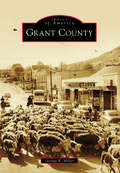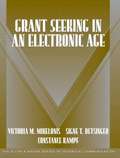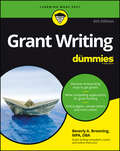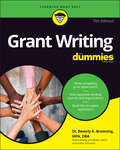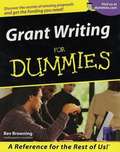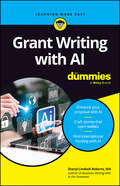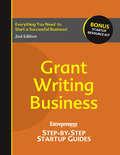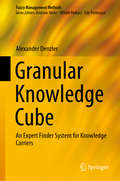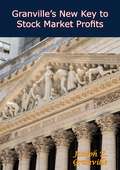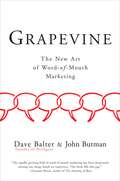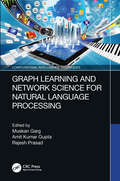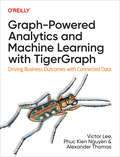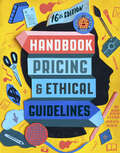- Table View
- List View
Granite Broadcasting Corporation (A)
by Amar V. Bhide Shawn J. Bryant Yolanda R. Daniels Nina T. Henderson M. Bruce RobinsonDon Cornwell and his partner Stuart Beck formed Granite Broadcasting Corp. (GBC) to acquire under-performing TV stations. Cornwell is now in his fourth acquisition. This case focuses on the management challenges and strategies he uses to turn around his stations, specifically the third acquisition.
Granite Broadcasting Corporation (A)
by Amar V. Bhide Shawn J. Bryant Yolanda R. Daniels Nina T. Henderson M. Bruce RobinsonDon Cornwell and his partner Stuart Beck formed Granite Broadcasting Corp. (GBC) to acquire under-performing TV stations. Cornwell is now in his fourth acquisition. This case focuses on the management challenges and strategies he uses to turn around his stations, specifically the third acquisition.
Granny's Goodies, Inc.
by Das Narayandas Kathy KormanThe young entrepreneurs of Granny's Goodies, Inc., a corporate gift package specialist, face the challenge of finding ways to create consistent revenue streams and reduce sales costs. Outside of a few long-term contracts, the two founders have had to work very hard for each sale. Using extensive customer information that the firm has diligently collected over the previous two years, students need to develop a plan that covers market selection, product policy, and relationship management strategy for the firm.
Grant County (Images of America)
by George R. MillerThe large number of immigrants traveling along the Oregon Trail bypassed Grant County because of its location. Most wagon trains used the northern route to the Columbia River. A few used the southern route toward southern Oregon. Grant County was left in between. When gold was discovered in the Canyon Creek area in 1862, the population swelled from scarcely 200 to more than 5,000, many of them Chinese. Today, Grant County’s population is approximately 7,500, with John Day, the largest city, at slightly less than 2,000. From the 1860s to near 1900, gold and the mining industry reigned, as upward of $26 million worth of gold was mined. As the supply of gold diminished, so did the population, and timber became the number one industry. Settlers from the East saw potential in the large stands of tall, straight ponderosa pine, and many sawmills came into existence. The sawmills have since greatly declined, but other settlers discovered that the acres of bunchgrass provided excellent cattle feed. Today, cattle is king. In the spring, the cattle herds are moved off their winter grounds to higher elevations; in the fall, they are herded back into the valley. In the past, these movements often took them through the heart of many cities.
Grant Seeking in an Electronic Age (Technical Communication Ser.)
by Victoria M. Mikelonis Signe T. Betsinger Constance KampfThis guide teaches students and professionals a systematic process for researching, designing, writing, and submitting successful grant-seeking proposals. <P><P>Focusing on proposals submitted for government, foundation, and corporation funding, Grant Seeking in an Electronic Age leads the reader through a six-step grant-seeking process, from researching potential funders, to designing, writing and submitting a proposal that follows the funder's guidelines. Grounded in theory, but rooted in successful practice, it teaches students what really works–a third of students who submit proposals based on this text's approach get funded within a year. The text's guided discovery process provides a useful framework for novice writers while its thinking-planning exercises offer useful ways of organizing information and discovering what still need to be researched.
Grant Writing For Dummies
by Beverly A. BrowningGrant Writing For Dummies, 3rd Edition serves as a one-stop reference for readers who are new to the grant writing process or who have applied for grants in the past but had difficulties. It offers 25 percent new and revised material covering the latest changes to the grant writing process as well as a listing of where to apply for grants. Grant writers will find:The latest language, terms, and phrases to use on the job or in proposals.Ways to target the best websites to upload and download the latest and user-friendly application forms and writing guidelines.Major expansion on the peer review process and how it helps improve one's grant writing skills and successes.One-stop funding websites, and state agencies that publish grant funding opportunity announcements for seekers who struggle to find opportunities. New to third edition.
Grant Writing For Dummies
by Beverly A. BrowningWrite award-winning grant proposals that build organizational capacity! For nonprofit and for-profit firms alike, grants can be a singular generator of growth and impact. But many leaders are intimidated and confused by the sometimes-complex grant application process. The truth, however, is that anyone can learn to write and send a powerful grant letter with the right help. In Grant Writing For Dummies, Dr. Beverly Browning draws on over four decades of experience writing grant applications and training grant writers to deliver a comprehensive and easy-to-follow roadmap to drafting and submitting grant applications that get funded. You’ll learn to craft the strongest application possible, find the best sources of funding from online databases, and present a realistic project budget plan. You’ll also find: Example types of funding requests that demonstrate how to apply the concepts discussed in the book New and updated material walking you through the entire grant-writing process, from beginning to end Writing techniques that capture the imaginations of grant reviewers who decide which applicants walk away empty-handed and which ones receive cashWhether you’re looking to fund your nonprofit, grow your business, or develop your research venture, you’ll find the guidance you need in Grant Writing For Dummies.
Grant Writing for Dummies
by Bev BrowningGet the scoop on government grants, make multiple grant requests, use words that make funders say 'yes', recycle rejected proposals, and more!
Grant Writing with AI For Dummies
by Sheryl Lindsell-RobertsSupercharge your next grant proposal with the power of AI A stand-out grant proposals can be the difference between your organization thriving, surviving, or folding. So don't miss the opportunity presented by artificial intelligence (AI) to take your grant proposals to the next level! In Grant Writing with AI For Dummies, business writer extraordinaire Sheryl Lindsell-Roberts delivers an exciting new guide to supercharging your next grant proposal with AI. She's helped countless organizations win millions of dollars in funding. In the book: Boost your chances of being selected for funding. Craft inspiring stories that tug at reviewer's heartstrings and wallets. Learn to write spot-on executive summaries. Crack the keyword code so electronic scanners notice you. Find loads of examples of actual AI output in addition to AI websites. With AI as your virtual assistant, you have a secret weapon to take your grant proposals to the next level. Grab a copy of Grant Writing with AI For Dummies today and see the difference a dash of AI can make!
Grant-Writing Business
by Entrepreneur MagazineStart Your Own Grant Writing BusinessThanks to funders like the Bill and Melinda Gates Foundation, grant writing is a growing industry and a vital service needed by nonprofit organizations. Order this guide and learn how to use your existing talents to get started as a grant writer-earning not only big profits but the priceless satisfaction that comes from helping laudable causes find funding.Grant writing is a craft that can be cultivated and mastered, and we show you how. You learn the main elements of a grant proposal, how to identify a need and propose a solution for foundations, where to look for grant funders, and what tactics to use to approach them.Learn everything you need to know to get started in this lucrative industry with step-by-step guidelines, including:Who needs grantsTypes of fundersFinding grantsUnderstanding a funders' guidelinesA to Z of the grant proposalEffective grant-writing techniquesHow to confidently run your businessIf you enjoy delving into research, have great writing and speaking skills, and can passionately communicate the missions of organizations you believe in, you could have a bright future as the owner of a grant writing business. This guide gives you a one-of-a-kind grant-writing toolkit and shows you how to use it to win funding.Whether you'd like to write full or part time, this guide's top-to-bottom look at the field ensures you start like a seasoned pro.This kit includes: Essential industry and business-specific startup steps with worksheets, calculators, checklists and more. Entrepreneur Editors' Start Your Own Business, a guide to starting any business and surviving the first three years. Downloadable, customizable business letters, sales letters, and other sample documents Entrepreneur's Small Business Legal Toolkit.
Grantham, Mayo, Van Otterloo & Co.--2001
by Andre F. Perold Joshua MusherAsset manager GMO underperforms the market during the 1996-2000 stock market bubble because of the focus on absolute risk. After suffering significant client withdrawals, performance again shines when the bubble collapses. Did they win the battle only to lose the war? This case reviews the quantitative investment process developed by the firm to manage assets and the philosophy behind the models and the firm. Now that performance has recovered, the partners contemplate why so much business was lost. Should they temper further bets to retain more business, or does the fiduciary duty to the client necessarily entail the risk that some clients will leave?
Grantham, Mayo, and Van Otterloo, 2012: Estimating the Equity Risk Premium
by Samuel G. Hanson Luis M. Viceira Erik StaffordCase
Grantham, Mayo, and Van Otterloo, 2012: Estimating the Equity Risk Premium (Abridged)
by Samuel G. Hanson Luis M. Viceira Erik StaffordCase
Grants, Remittances, and the Equilibrium Real Exchange Rate in Sub-Saharan African Countries
by Joannes Mongardini Brett RaynerA report from the International Monetary Fund.
Grantsmanship: Program Planning And Proposal Writing
by Barbara Floersch Cathleen E. Kiritz Norton J. KiritzInviting, practical manual for nonprofits, educational and government agencies on how to plan effective programs, contact appropriate funders, and write effective grant proposals to get funding.
Granular Knowledge Cube: An Expert Finder System for Knowledge Carriers (Fuzzy Management Methods)
by Alexander DenzlerThis book introduces a novel type of expert finder system that can determine the knowledge that specific users within a community hold, using explicit and implicit data sources to do so. Further, it details how this is accomplished by combining granular computing, natural language processing and a set of metrics that it introduces to measure and compare candidates’ suitability. The book describes profiling techniques that can be used to assess knowledge requirements on the basis of a given problem statement or question, so as to ensure that only the most suitable candidates are recommended. The book brings together findings from natural language processing, artificial intelligence and big data, which it subsequently applies to the context of expert finder systems. Accordingly, it will appeal to researchers, developers and innovators alike.
Granularity Theory with Applications to Finance and Insurance
by Patrick Gagliardini Christian GouriérouxThe recent financial crisis has heightened the need for appropriate methodologies for managing and monitoring complex risks in financial markets. The measurement, management, and regulation of risks in portfolios composed of credits, credit derivatives, or life insurance contracts is difficult because of the nonlinearities of risk models, dependencies between individual risks, and the several thousands of contracts in large portfolios. The granularity principle was introduced in the Basel regulations for credit risk to solve these difficulties in computing capital reserves. In this book, authors Patrick Gagliardini and Christian Gouriéroux provide the first comprehensive overview of the granularity theory and illustrate its usefulness for a variety of problems related to risk analysis, statistical estimation, and derivative pricing in finance and insurance. They show how the granularity principle leads to analytical formulas for risk analysis that are simple to implement and accurate even when the portfolio size is large.
Granville’s New Key to Stock Market Profits
by Joseph E. GranvilleIn this remarkable stock market study, one of Wall Street’s best known market analysts reveals a new technical tool he developed for gauging the pulse of the trading cycle.Called the On Balance Volume Theory, this tool tends to fill in some of the conspicuous voids in the famous Dow Theory—especially the lack of discussion and use of stock volume figures.As straightforward as a set of bridge rules, on-balance volume (OBV) denotes each buy and sell signal so that a trader can follow them without his own emotions tending to lead him astray—emotions causing most of the market misjudgements that take place.The Granville OBV method is essentially scientific, has a high degree of accuracy and has many automatic features. The reader of this book will be introduced to a method whereby he may benefit by the earlier movements of volume over price—the “early warning” radar of volume buy and sell signals.
Grapevine
by John Butman Dave BalterWord of mouth is an amazingly powerful force - but how does it really work?. Businesses have become obsessed with stimulating word-of- mouth to counteract the declining effectiveness of advertising. But it’s easier said than done. As the founder of BzzAgent, a community of more than 400,000 people who volunteer to talk to friends and acquaintances about products they genuinely love, Dave Balter is a successful practitioner, not a theorist. And he’s figured out how to measure and harness word-of-mouth without corrupting it. In Grapevine, Balter shows why honest feedback - about books, restaurants, gadgets, or anything else - is more believable than any paid endorser. And he answers some of the most elusive questions in marketing, such as what makes word-of-mouth very different from "buzz” and "viral marketing. ” .
Grapevine
by Dave BalterWord of mouth is an amazingly powerful force -- but how does it really work?. Businesses have become obsessed with stimulating word-of- mouth to counteract the declining effectiveness of advertising. But it's easier said than done. As the founder of BzzAgent, a community of more than 400,000 people who volunteer to talk to friends and acquaintances about products they genuinely love, Dave Balter is a successful practitioner, not a theorist. And he's figured out how to measure and harness word-of-mouth without corrupting it. In Grapevine, Balter shows why honest feedback - about books, restaurants, gadgets, or anything else - is more believable than any paid endorser. And he answers some of the most elusive questions in marketing, such as what makes word-of-mouth very different from "buzz" and "viral marketing."
Graph Learning and Network Science for Natural Language Processing (Computational Intelligence Techniques)
by Muskan Garg, Amit Kumar Gupta and Rajesh PrasadAdvances in graph-based natural language processing (NLP) and information retrieval tasks have shown the importance of processing using the Graph of Words method. This book covers recent concrete information, from the basics to advanced level, about graph-based learning, such as neural network-based approaches, computational intelligence for learning parameters and feature reduction, and network science for graph-based NPL. It also contains information about language generation based on graphical theories and language models. Features: -Presents a comprehensive study of the interdisciplinary graphical approach to NLP -Covers recent computational intelligence techniques for graph-based neural network models -Discusses advances in random walk-based techniques, semantic webs, and lexical networks -Explores recent research into NLP for graph-based streaming data -Reviews advances in knowledge graph embedding and ontologies for NLP approaches This book is aimed at researchers and graduate students in computer science, natural language processing, and deep and machine learning.
Graph-Powered Analytics and Machine Learning with TigerGraph: Driving Business Outcomes with Connected Data
by Alexander Thomas Victor Lee Phuc Kien NguyenWith the rapid rise of graph databases, organizations are now implementing advanced analytics and machine learning solutions to help drive business outcomes. This practical guide shows data scientists, data engineers, architects, and business analysts how to get started with a graph database using TigerGraph, one of the leading graph database models available.You'll explore a three-stage approach to deriving value from connected data: connect, analyze, and learn. Victor Lee, Phuc Kien Nguyen, and Alexander Thomas present real use cases covering several contemporary business needs. By diving into hands-on exercises using TigerGraph Cloud, you'll quickly become proficient at designing and managing advanced analytics and machine learning solutions for your organization.Use graph thinking to connect, analyze, and learn from data for advanced analytics and machine learningLearn how graph analytics and machine learning can deliver key business insights and outcomesUse five core categories of graph algorithms to drive advanced analytics and machine learningDeliver a real-time 360-degree view of core business entities, including customer, product, service, supplier, and citizenDiscover insights from connected data through machine learning and advanced analytics
Graphic Artists Guild Handbook, 16th Edition: Pricing & Ethical Guidelines
by The Graphic Artists GuildThe industry bible for communication design and illustration professionals, with updated information, listings, and pricing guidelines.Graphic Artists Guild Handbook is the industry bible for communication design and illustration professionals. A comprehensive reference guide, the Handbook helps graphic artists navigate the world of pricing, collecting payment, and protecting their creative work, with essential advice for growing a freelance business to create a sustainable and rewarding livelihood. This sixteenth edition provides excellent, up-to-date guidance, incorporating new information, listings, and pricing guidelines. It offers graphic artists practical tips on how to negotiate the best deals, price their services accurately, and create contracts that protect their rights. Sample contracts and other documents are included. For the sixteenth edition, the content has been reorganized, topics have been expanded, and new chapters have been added to create a resource that is more relevant to how graphic artists work today. Features include:More in-depth information for the self-employed on how to price work to make a sustainable living and plan for times of economic uncertainty.A new chapter on using skills and talents to maximize income with multiple revenue streams—workshops, videos, niche markets, passion projects, selling art, and much more.Current U.S. salary information and freelance rates by discipline.Pricing guidelines for buyers and sellers.Up-to-date copyright registration information.Model contracts and forms to adapt to your specific needs.Interviews with eleven self-employed graphic artists who have created successful careers,using many of the practices found in this Handbook.

